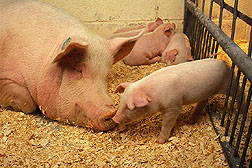This page has been archived and is being provided for reference purposes only. The page is no longer being updated, and therefore, links on the page may be invalid.
|
Pig Gene Database Supports Human Nutrition, Immunity Studies
By Jim CoreAugust 26, 2005
A searchable, online database that allows users to compare information on 2,600 annotated swine genes and proteins related to nutrition and immunity was launched today by Agricultural Research Service scientists.
The new resource is called the "Porcine Immunology and Nutrition (PIN) Database" and is available at:
Pigs and humans share anatomical and physiological features that are useful for modeling the effects of nutrition on human immune function and response to disease. In some cases, studies that are difficult or impossible to do in humans can be explored in pigs.
But molecular and genomic-based pig data cannot be compared with sophisticated human and rodent databases because existing pig databases are poorly annotated for immune- and nutrition-related genes. By providing information on pig genes and proteins, researchers can compare gene expression patterns in pigs with the more extensive information provided in human and rodent databases.
The database was produced by nutritionists at the ARS Beltsville (Md.) Human Nutrition Research Center and immunologists in the ARS Animal and Natural Resources Institute in Beltsville, headed by research nutritionist Harry Dawson. ARS is the U.S. Department of Agriculture's chief scientific research agency.
At the Nutrient Requirements and Functions Laboratory, Dawson and Joseph Urban, a microbiologist and the unit's research leader, develop sensitive molecular tests for pig cytokine genes and receptors associated with nutrition and immunity to food allergens that threaten human health.
The database is a unique porcine database because it links gene expression to gene function and identification of related gene pathways, and its information can be coordinated with other databases related to the functional genetics of humans and mice. The database contains information on 385 validated genetic fingerprinting tools called real-time polymerase chain reaction (PCR) assays, as well as 440 other real-time PCR assays that are currently undergoing validation. It also contains a comprehensive catalog of anti-porcine antibodies with links to referenced literature and vendors.
These assays are currently used by more than a dozen laboratories worldwide. The release of the database will greatly facilitate global use of swine as an important biomedical research tool and will solidify ARS' role as a leader in studies of basic swine nutritional immunity.

